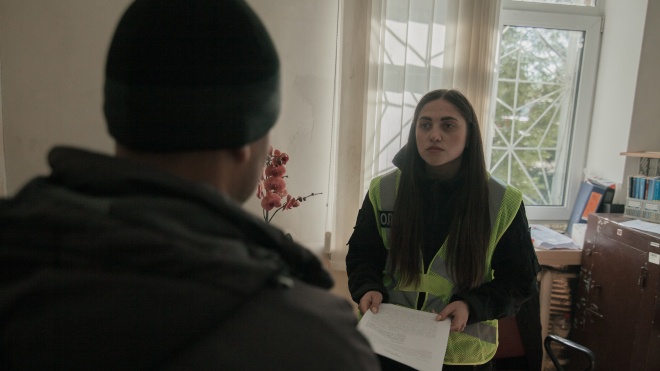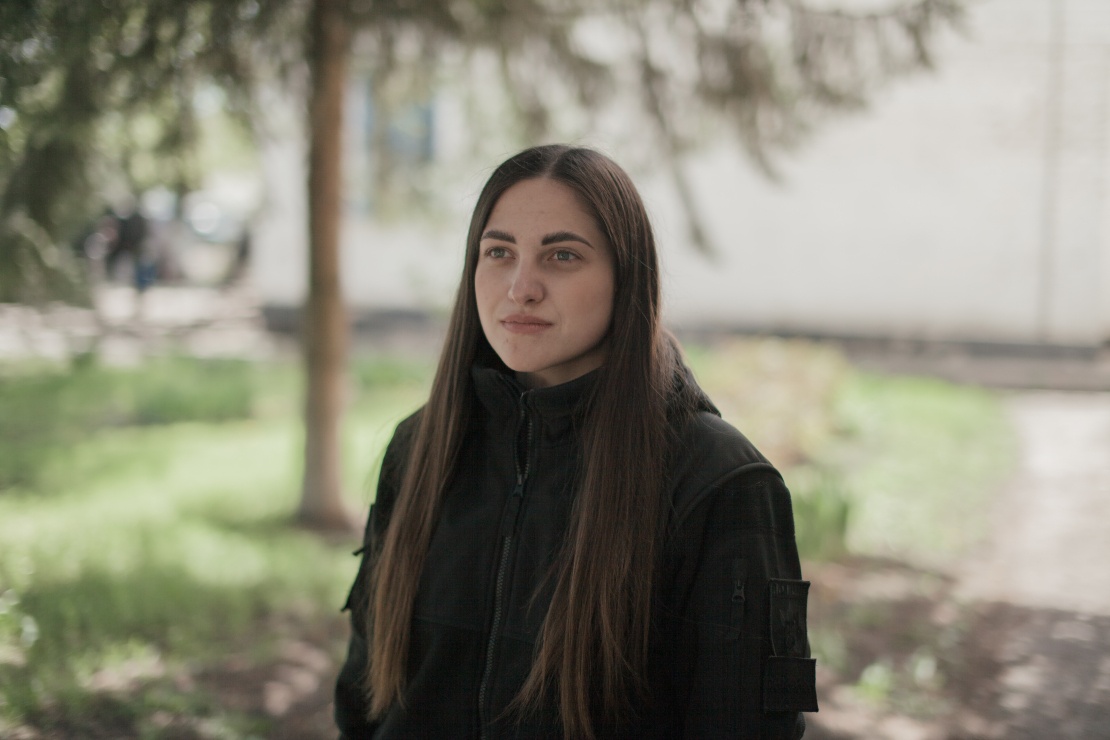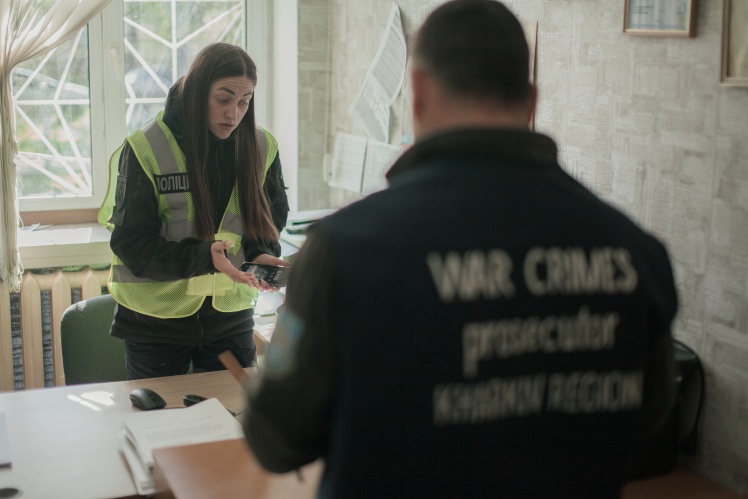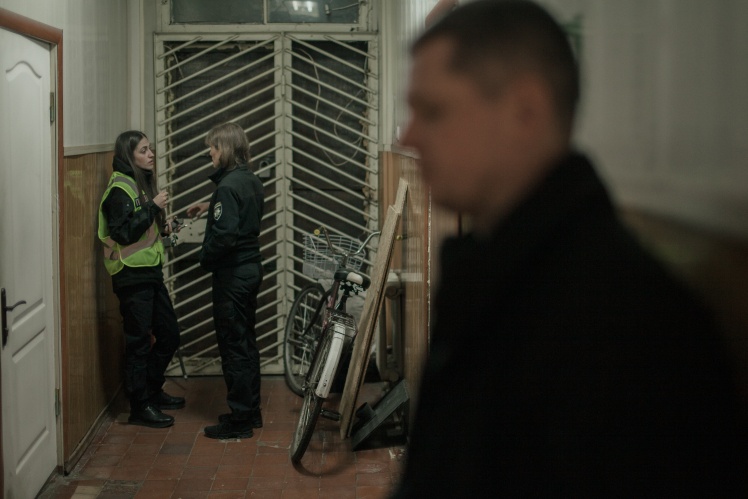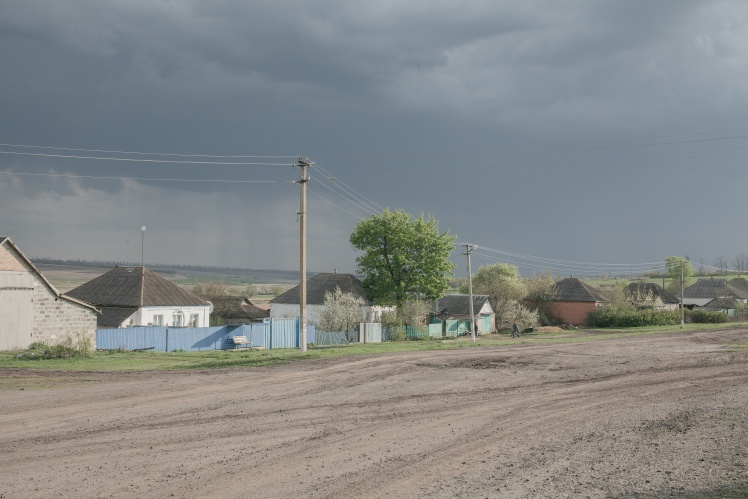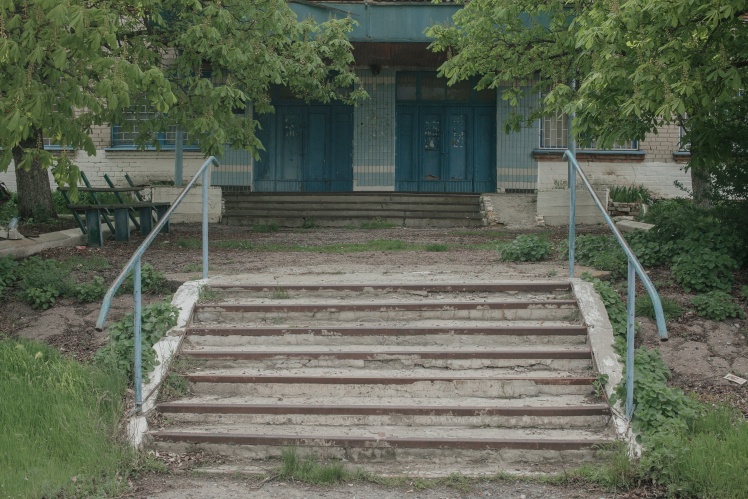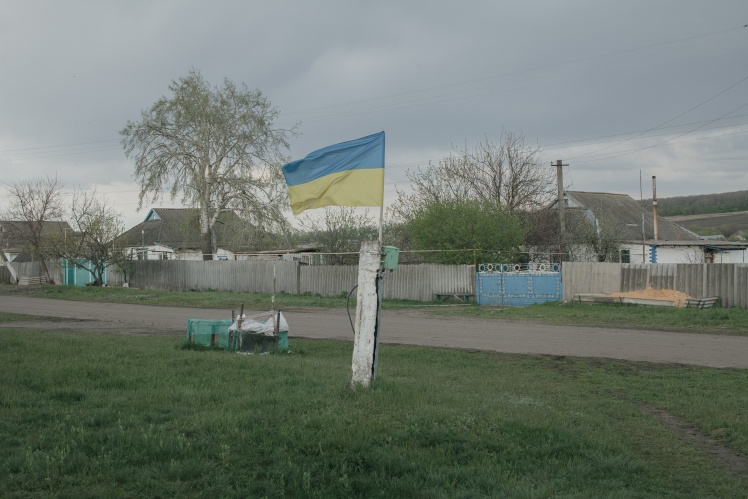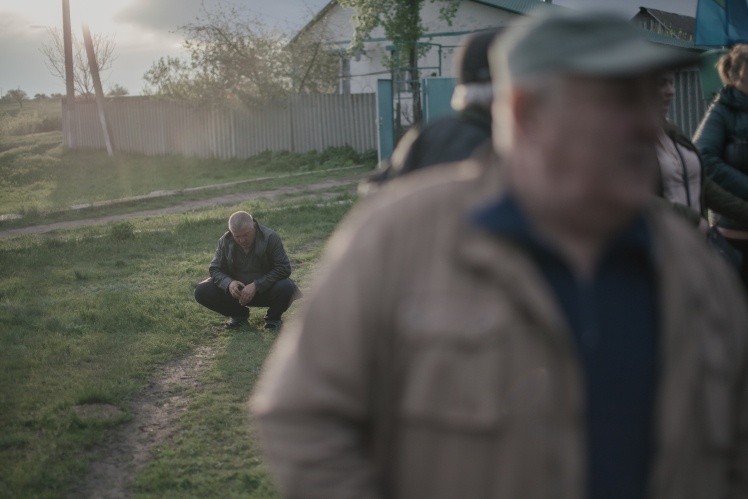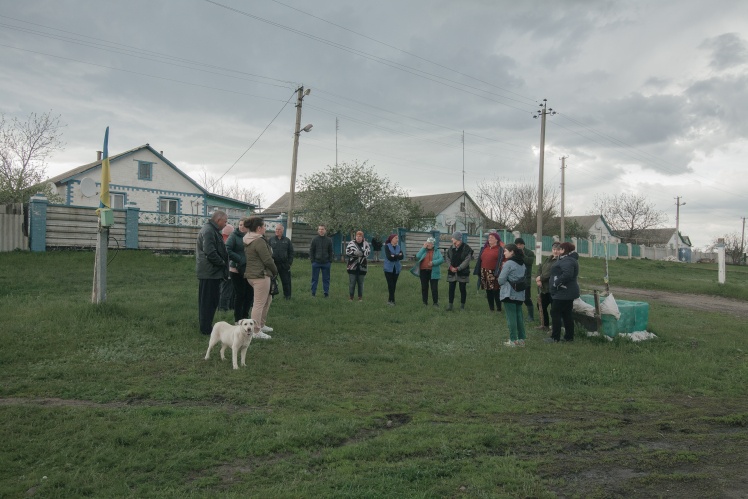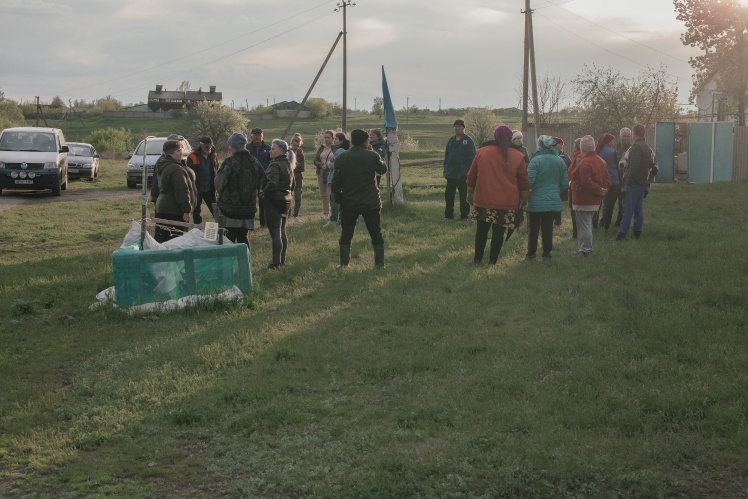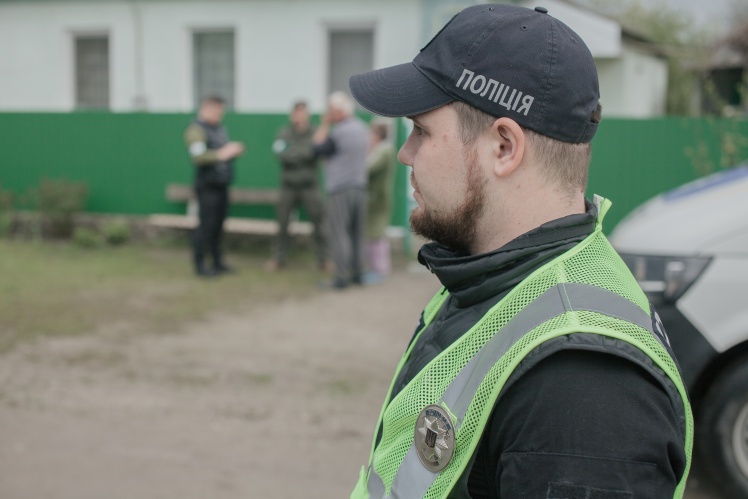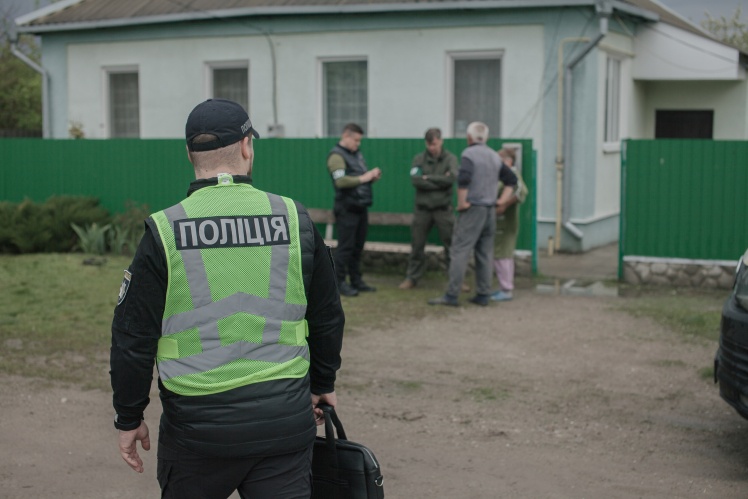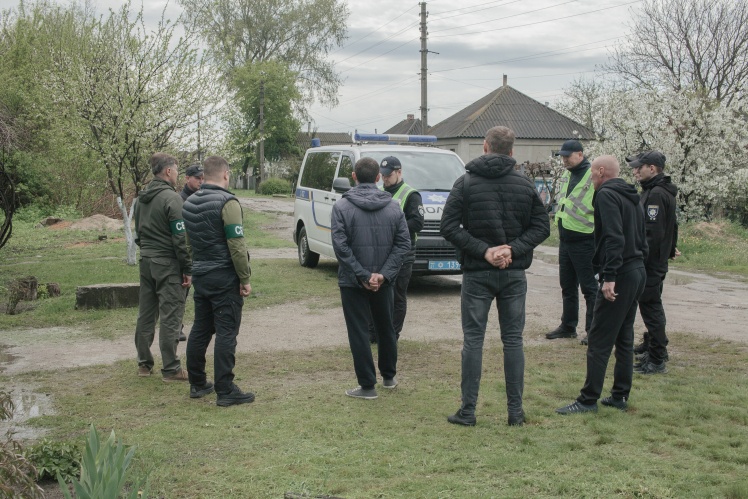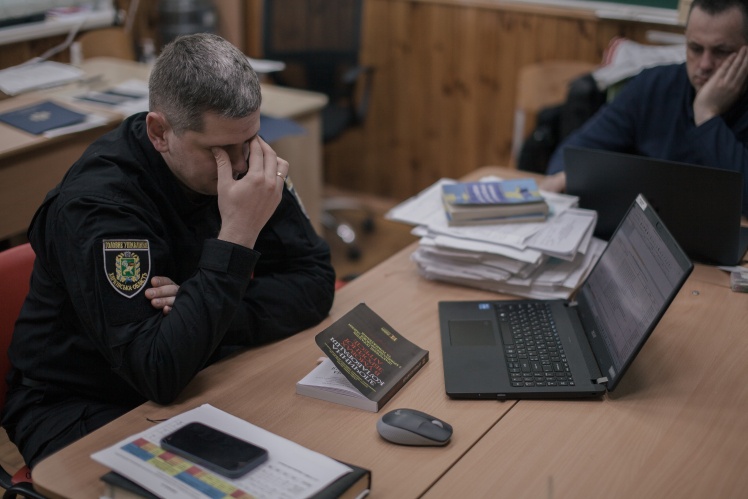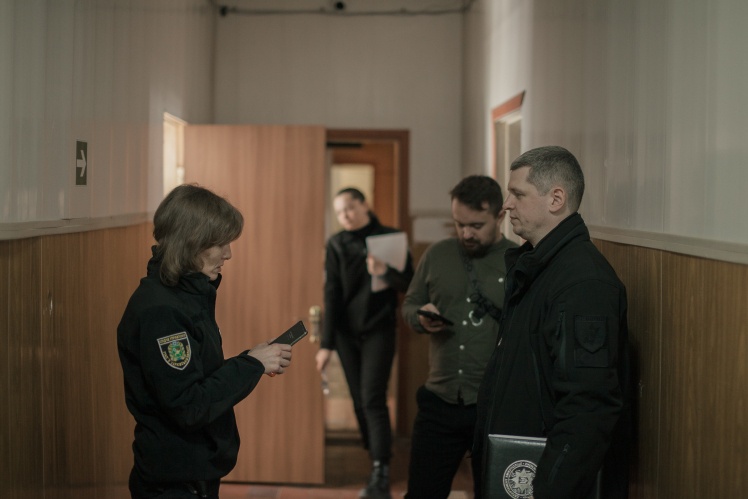Shevchenko village. Farmer-collaborator
The village of Shevchenko is an hourʼs drive east of Kharkiv. There are three important points in the center — the market, the bank and the police station. At 8 oʼclock in the morning on April 26, shops open on the market, a queue for a humanitarian aid gathers near the bank — and a man in a baggy gray tracksuit is brought to the police.
Investigator Yulia Brazhko is in the police office. She is 27 years old and has been managing the department since 2021. She handles the case of a man who has just been brought into the building. He is a farmer from the nearby village of Semenivka. They suspect that he sold grain to the Russians and fraternized with them: he celebrated May 9, walked the streets with weapons supposedly for order, treated wounded Russians.
Investigator Yulia Brazhko.
Mykhailo Melnychenko / «Babel'»
Hereʼs what it is:
if a person publicly denies or justifies the aggression of the Russian Federation against Ukraine, or supports it, the court determines how long, in the period from 10 to 15 years, one cannot hold certain positions;
if a person works for the occupiers, but not in a managerial position, it is also not possible to work in certain positions for 10-15 years, but property may also be confiscated;
if a person implements Russian education standards in kindergartens, schools, and universities, engages in propaganda, they may be assigned correctional labor for up to 2 years, arrested for up to 3 years, and prohibited from working in certain positions for 10-15 years;
if a person voluntarily transfers material resources to the occupiers — for example, feeds the occupiers or re-registers a business for them — they can be fined up to 10,000 tax-free minimums, arrested for 3-4 years or banned from working in certain positions for 10-15 years and property confiscated. As of now, the fine can be up to 13 million 420 thousand UAH;
if a person voluntarily works for the occupiers and holds a managerial position, the punishment is arrest for 3-5 years, confiscation of property and prohibition to work in certain positions for 10-15 years;
if a person informationally and politically supports the occupiers — he or she faces 10-12 years of imprisonment, confiscation of property and a 10-15-year ban on working in some positions;
if a person voluntarily works in judicial bodies or in the police in the occupied territory, the outcome is 12-15 years of imprisonment, prohibition to work in certain positions for 10-15 years and confiscation of property;
if a person committed any of the three previous violations and many people died because of it, life imprisonment or 15 years imprisonment, a ban on working in certain positions for 10-15 years, and confiscation of property.
The case against the farmer was entered into the joint register on October 21, 2022, that is, a month and a half after the deoccupation of the Kharkiv region. At first, it was investigated by the Security Service of Ukraine. Due to the lack of investigators, such cases are transferred from the SBU to the police — this one was transferred in January. In three months, thanks to Yulia Brazhko, the farmer was issued a suspicion. It is quite fast for such cases — the fact that that fellow villagers were ready to testify helped. Yulia herself lived in the occupation for half a year, she knows who among the locals worked with the Russians, and who can tell about it. Locals know her well, so they trust her more.
Shevchenkove was occupied on February 26. Yulia didnʼt want to leave — she just hid the bags with criminal case files in the garage. At first, the Russians were not interested in the village — it was too small. first they had to establish their order in larger towns, so they almost never visited Shevchenkove. For almost two weeks of the occupation, Yulia went to the police station in uniform and solved local problems.
“The management ordered me to leave, but I couldnʼt leave my parents and my husband, a member of the Ukrainian Armed Forces,” says Yulia. “Almost everyone left by the end of April. And we believed that we will be liberated very soon.”
Investigator Inna Kucherenko. The wallpapers in her office were put in place by local criminals arrested by the Russians. She also managed and continues to manage their cases.
Mykhailo Melnychenko / «Babel'»
In April, the Russians began to search the houses of police officers. When Yulia found out about it, she cut her ID. In May, a former colleague came to her and invited her to a “meeting with the FSB” on June 6. Yulia refused and waited for the searches, but the FSB officers did not come to her. She left Shevchenkove in August via Russia and was in Latvia for two months.
Yulia claims that out of about 40 people in the police station, ten of them went over to the side of the occupiers. No one of therm were from the management. About those who cooperated with the Russians, Yulia says that they never had sympathy for Russia. But the woman thinks that they just wanted to make a career. It didnʼt work out that way — the Russians got the leadership positions, and the Ukrainians remained rank and file.
Yulia currently has only one subordinate — senior investigator, police captain Inna Kucherenko. She says that the search of a farmer in Semenivka was carried out at dawn — they were afraid that the locals would warn him.
“The family did not prevent the search, but they categorically donʼt admit guilt,” says Inna. “Although the man, because of shock, admitted that he was exporting grain to Russia. Unfortunately, we did not find what we were looking for — weapons and Russian rubles.”
Locals told the investigators that they saw a farmer carrying grain and traveling with Russians on the only road that goes through several villages.
“There is one sure witness — he said that the suspect made a place for wounded orcs in his cowshed, and bloody bandages were found there,” says Inna.
A forty-year-old suspect in a baggy suit is standing in Yuliaʼs office. He is silent and hides his eyes, Yulia confidently and quickly reads the arrest report and suspicion. The man frowns, but signs everything. His lawyer adds that he will not testify, and the man is being taken to the pre-trial detention center. Yulia happily organizes the documents.
Investigator Yulia Brazhko and the prosecutor are preparing to read the suspect to the detained farmer. The investigators are talking in the corridor while the lawyer is talking to the detainee.
Mykhailo Melnychenko / «Babel'»
Semenivka community
Near Shevchenkove there is the village of Semenivka, where the detained collaborator lived. The village is rather small: 500 people lived here before the full-scale war. The streets are empty. In the center of the village is a closed shop, cows are grazing nearby and a tractor is standing. Two women in their 50s and 70s are sitting on a bench under a cherry tree. I ask if they have heard anything about yesterdayʼs detention.
“I could tell you, but they are eating me up here so much that I canʼt bear it,” one of them shakes her head. “I even want to get out of here. They worked for the Russians, and I support Ukraine. So he [the collaborator] was taken away, and they are already saying that it was because of me and that I handed him [to the police], although I didnʼt write anything anywhere.”
To an unsuccessful joke about having to move the house, the woman seriously replies that she will not leave her land. It is felt that she wants to tell everything, but hesitates. In the end, the woman says that her name is Iryna, calls several fellow villagers, and gets into the car with us.
“There are some insignificant collaborators, but these ones did everything openly and so shamelessly! And the father of that Dimka, who was taken away yesterday, is the same,” Iryna begins to tell in the car. “They behave so free as if the Russians still rule here. They are still waiting for the Russians to come,” she continues.
Iryna asks to stop near the blue-yellow flag hanging in the distance in one of the yards. This is the second flag at this place: the first one after the deoccupation was taken down by supporters of the Russians, and this one was hung by the wife of a person who died at the front — the flag was handed over to the family posthumously. So far, it has not been touched.
The streets of Semenivka before a thunderstorm. The flag that was given to the family of a fallen soldier from Semenivka.
Mykhailo Melnychenko / «Babel'»
Three women are waiting under the flag. Over the next few minutes, a dozen more villagers arrive. Grannies in bright scarves, women in jackets and vests, men in old suits and sneakers, mothers with children. They speak a lot — everyone wants to tell about collaborators. It is still scary to speak individually, but easier in a group.
“They fed them [Russians], and went to banya with them, and sang “Victory Day” song, because Ukraine forbade them! They said that Ukraine would no longer come,” says Iryna first.
“Dimka [the detained farmer] was walking here in a T-shirt signed "For united Russia",” exclaims another woman from the circle.
When the village was occupied, yesterdayʼs detainee — for the locals simply Dimka — was met by a Russian. He convinced his fellow villagers that it is better to live in ruins under Russia than under Ukraine. He helped the Russians place Grads near the large elevator, which is clearly visible from Bohodarivka. He cleared the way for them with his agricultural machinery. He told information about acquaintances whose relatives served in the Ukrainian Armed Forces, drove a car with the letter “Z” and a St. George ribbon on it. He set up a hospital for Russians in a cowshed, and at home he received the occupiers, fed them, arranged a bath for them, drank with them and sang Russian songs. He also came to torture and “patroled” the streets in the uniform of the occupiers with a machine gun.
“We were so afraid,” says Zhenya, a thin woman in a blue cap and white vest. “Dimka with a machine gun arrived and says: "You will stand on your knees." And why do I have to stand on my knees? My son-in-law died at the front on September 10. And this one walks like nothing happened!”
But the most important thing for the law is that the man sold grain to Russia. People saw Russian grain trucks carrying grain to the border. The Russians accompanied his equipment with fertilizers, and stopped the shelling while the farmer worked in the field. Others could not even cultivate the land for themselves.
The Semenivka community gathered to talk about collaborators in the village and impunity.
Mykhailo Melnychenko / «Babel'»
Dmytro was not the only one who collaborated with the Russians. His father, and another farmer, and a teacher of Ukrainian language and history — fellow villagers accuse all of them in collaborationism. Someone went to meetings of the occupiers, someone threatened the children that they would be shot by the Russians, someone called the Russians “ours”. And they still call it that.
The police collected testimonies from almost the entire village. However, they still need photos and videos — but no one took them. It is now difficult to prove guilt: the villagers are afraid that the collaborators will pay some bribes and then they will have to live side by side. Locals say that “Dimka” already boasted that he “gave 500,000 to the Ukrainian Armed Forces” and now he will not be imprisoned. None of the collaborators apologized for their deeds.
“But Dimka loved Russia!”, the short toothless Kolya convinces.
Another man, farmer Oleksii from a nearby village, is not so sure.
“I donʼt know why he was doing that,” he says. “He was supporting the [pro-Russian] Party of Regions, then [its successor] OPzZh — probably, he was brainwashed. They were normal farmers. They paid people. And now their daughter is spitting on the Ukrainian flag in Russia wearing a "Z" T-shirt. Look at their house: what did they lack?” And he himself answers: “Intelligence, for sure.”
“They still walk around the village like they used to. And nothing was done to them, nothing! And we lived shaking for eight months!”, exclaims a woman whose son-in-law died at the front. “We have already had enough. We lived in fear during the occupation, and we live in fear now. We want them to be punished according to the law.”
The villagers were happy to give evidence to the police. But half a year has passed, and no one has been put in prison. So now they are more and more silent and afraid.
“In one village collaborators were taken away, in another — and we are silent,” a woman with a short dark haircut spreads her hands. “We are happy for the these villages, but we need this to happen here.”
The elevator near which the Russians placed military equipment during the occupation.
Mykhailo Melnychenko / «Babel'»
“They [collaborators] will be lucky if they leave this place and get arrested,” adds Oleksiy. “When our boys return from the war, they will shoot them.”
The rest of the people murmur in approval.
“It will be better if they help our community,” continues Oleksiy. “Because if we start it ourselves, what will it be? We cannot self-judge, we are a European state.”
Balakliia
The affairs of the district, which includes Shevchenkove and Semenivka, should be handled by the prosecutorʼs office in Kupyansk. But it is constantly under fire, so it cannot work stably. I have to contact Kharkiv. Kharkiv investigator Oleksandr Kobylev explains:
“Civilians do not understand aspects of our work. They imagine armed men in masks kicking down doors and putting suspects on the floor. We can do it, but the harm must not exceed the good we hope for. Itʼs not all action movie.”
Investigator Oleksandr Kobylev in Kharkiv.
Mykhailo Melnychenko / «Babel'»
The next search of one of the collaborators will take place in Balakliia. At the local police station, we meet investigator Samir Huseynov. A thunderstorm begins, and he freezes at the wide sound of thunder — too reminiscent of explosions.
"This man served as a precinct officer in the "peopleʼs militia," Huseynov says about the local man who will be searched. ”There were about twenty such people in Balakliia. There are witnesses who saw him at work. So letʼs go to his home and look for evidence.”
Huseynov fills out the papers and waits for investigator Yevhen Horlach, who will be in charge of the search. The scale of the search for collaborators is no longer the same as in the fall, but there is enough work. Samir says that criminals do not run away because they believe that no one knows anything about them or they do not believe in punishment. Samir often walks the streets of the town and meets those on whom he is preparing a case. But he canʼt hurry — the further, the more nuances arise during the trial, the more evidence the prosecutorʼs office requires, in addition to witnesses. Also, the witnesses themselves refuse to speak out of fear, and they leave or die.
We are going with the investigators to the outskirts of Balakliia. A broken bridge separates the large private sector from the rest of the town. We stop near the house, where there will be a search. In front of the gate there is mowed grass, flowers, on the window there is a faded icon-calendar. The dog, having heard the strangers, starts barking, and the tall gray-haired owner — the suspectʼs father — comes out to bark.
“He went somewhere. Should I call?” he asks calmly, opening the gate. The mother, a short round-faced woman with gray hair visible through the paint, comes out of the house. She calls her son on the go and hurriedly asks:
“Hello, are you going to take away our son? He came to both the State Bureau of Investigations and Security Service of Ukraine, he did nothing wrong. We had nothing to live for. He did not receive that money, he stayed there for a week. We didnʼt even want to receive their pensions. And he does not run away.”
Yevhen Horlach during a search on the outskirts of Balakliia. The decision on the search and its rules are read to the man.
Mykhailo Melnychenko / «Babel'»
The investigator and operatives are silent, witnesses are loitering on the road in front of the house and smoking.
“What kind of people are you?”, the mother says less balanced. “So are you going to take him away? At least you could tell in advance so he can pack some things.”
“We wonʼt take him away,” one of the policemen canʼt stand it. “Weʼll just see.”
“He went to the waterworks [to have a job during the occupation] ― they didnʼt take him. They did not take him to work at the housing and communal services. They just didnʼt give people jobs. He was sitting in the administration building for a week and did nothing,” the mother convinces and sobs.
The woman complains about how difficult it was to live in the occupation, how the five of them and the sick woman hid in the cellar, how the children wanted to eat, how the grandfather was buried in the first days of the occupation, and the son pulled the bodies of dead neighbors from under the rubble and brought food under shelling. He worked at a factory, where his salary was not paid for several months, and he joined the “police” because of hardship.
“Kostya, will they take away our Sasha?”, she asks a police officer she knows. “We are normal people, you know that.”
“No one will take him away!”, Kostya waves it off.
“We were at the cemetery, and I thought how happy those who lie there are: they donʼt see this anymore,” the mother starts wailing.
“But stop it!” Kostya is embarrassed.
“I ask him what we are going to do, and he says that he will not run away, because he has never done anything wrong, he helped people...”
“Because they didnʼt let him do anything,” SBU officer interrupts her. “If he had been in the occupation at least half a year more...”
A short dark-skinned man in his early thirties approaches the group. Worn tracksuit, blue jacket, short black hair. Cheerfully and kindly he says:
“Hello.”
Search on the outskirts of Balakliia. The suspect is not hiding or running away.
Mykhailo Melnychenko / «Babel'»
The search goes quickly: the suspect is read the decree, the officers go to the house, and in twenty minutes return with nothing. The street is empty all the time. Only an elderly woman from the opposite house comes out to see what happened and summarizes: “These are good people.”
When the law enforcement officers and the family leave the yard, Sashaʼs father is just as silent. A possible collaborator also gets into one of the cars — they go to search his apartment, which was destroyed by artillery. When the car drives away, the mother is already crying out loud.
They donʼt find anything in the apartment either. After an hour in the police station, the suspect is still as calm. He signs the protocols, and prepares to go home. Finally, already from the corridor, he looks into the office and asks our photographer:
“And where to see the photo later?”, he says and smiles.
Yevhen Horlach asks the man who was searched to sign the documents.
Mykhailo Melnychenko / «Babel'»
Investigator Yevhen returns to the office and says that no evidence has been found.
“But the case will go further. There are also testimonies, documents. The court will study and impose a punishment. And the mother... Her words will also be taken into account, but she is an interested person,” says the investigator confidently.
“What do you think, is he really a collaborator?” I ask.
“I canʼt think. I rely on the evidence,” Yevhen spreads his hands.
Investigators
Investigators are reluctant to talk about collaborators. They say that they follow only on the law. Nevertheless, they show how they feel about what happens after de-occupation. Some say that civilians were in a difficult position during the occupation, so you have to consider the context. Many people know the collaborators personally, because they all live in small towns. Some of the law enforcement officers admit that there are still many collaborators among the neighbors, and they can threaten their elderly parents or small children. But investigators usually donʼt talk about it. Firstly, it is not desirable, secondly, civilians are unlikely to understand this.
Oleksandr Kobylev says that the further it goes, the more difficult it is to find evidence of the collaboratorsʼ guilt. Moreover, for ambiguous cases where teachers do not implement the educational standards of the occupiers, but work according to already approved ones, or when locals feed Russians, which can be called a transfer of material resources, but must be proven.
“At first, due to the shock of the collaborators, the investigators quickly collected the evidence base and sent it to court,” says Oleksandr. “Those who received suspicion later destroyed the evidence, denied guilt, invented that they were forced to do something. In this case, the lawyer still acts as the client wants and takes his or her position.
Investigator Oleksandr Kobylev. Oleksandr Kobylev and investigators of the Kupyansk district in the corridor of the police station in Shevchenkove.
Mykhailo Melnychenko / «Babel'»
Another thing, says Oleksandr, that is difficult for civilians to understand is that their moral ideas about collaborationism differ from the lawʼs definition. Perhaps, he admits, the law is too loyal. But even if it is replaced, old cases cannot be opened again. Therefore, Oleksandr hopes to share his experience and work, perhaps according to updated rules, already with colleagues from the next de-occupied regions.
Yulia Brazhko says that there are less and less evidence — now collaborators are destroying documents that the occupiers did not take away in a hurry during the retreat.
“At first, the collaborators tried to be invisible, they thought we wouldnʼt find out,” says Yulia. And her subordinate Inna adds:
“But we know everything about everyone.”
Translated from Ukrainian by Anton Semyzhenko.
The people of Semenivka need to catch all the collaborators, and we need to collect all your donations! Support Babel: 🔸 in hryvnia 🔸 in cryptocurrency 🔸 Patreon 🔸 PayPal: [email protected]
Law enforcement officers take a photo for their own social networks in front of the police station in Shevchenkov.
Mykhailo Melnychenko / «Babel'»
